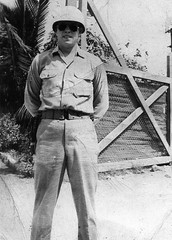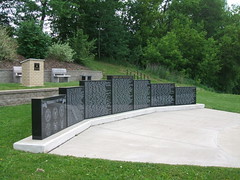Moammar Gadhafi was killed today. All day long I’ve been reliving the fear he brought to me and my family 25 years ago. And I’m sure that’s small compared to terrors he’s wrought upon people in his own country.
25 years ago, I was a military wife with young children. We lived in Berlin, at that time an occupied territory as it had been since the end of WWII. Berlin was a city where many people came for political asylum, and there were many Libyans in the city, especially on the east side of the Wall.
April 6th is carved in my memory, as the day of the bombing at La Belle discotheque. I’ve never been there, but lots of our soldiers and airmen went there. The bomb was hidden under a table, and when it blew up, U.S. Sergeant Kenneth T. Ford and a Turkish civilian woman were killed instantly. A second American, Sergeant James E. Goins, died from his injuries two months later. 230 people were injured.
37 military members were awarded the purple heart in a ceremony on Memorial Day that year, in accordance with an Executive Order made in 1984 by President Ronald Reagan authorizing the Purple Heart for military members injured as a result of terrorist actions. I was a Cub Scout leader, and we took the pack to the ceremony at Clay Headquarters. It was a sobering event, and one I hope the kids still remember. The online archived Berlin Observer takes me back to that day like it was yesterday. The Observer lists the names of the Purple Heart recipients on page 12.
On April 15th of 1986, I woke to AFN (Armed Forces Network) radio reports that President Reagan had ordered a bombing of Libya in retaliation. What followed was a period of highest security, to protect against potential further Libyan action. Berlin American High School, where I taught, was surrounded by tanks. One of our biggest problems as teachers was keeping the girls from going out and flirting with the 40th Armored tank soldiers.
Each of the school buses that carried the American kids across the city was assigned 2 armored jeeps (front and back). Lining up all those buses and their jeeps (who would NOT leave their bus) was a real challenge.
The elementary school had infantry soldiers guarding all the doors. They inspected every backpack and lunch box that entered – and critiqued the kids’ lunches (to their delight).
It was quite a time. Vehicles were inspected for potential car bombs driving in and out of military installations and housing. And yes, there were a number of bombs. One day I saw one explode in a parking lot. Whenever we found an unattended parcel anywhere, we called the military police, and they dispatched weapons experts. I still experience paralyzing fear when I find backpacks in the library – and yes, I do take precautions. It’s funny how we become the sum total of all our experiences.



